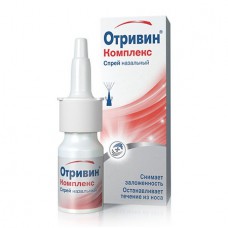Expiration date: 12/2025
Composition
Nasal spray
1 ml
active substances:
of Xylometazoline hydrochloride
0.5 mg
ipratropium bromide monohydrate
0.6 mg
auxiliary substances: glycerol (85%) and 27.9 mg; disodium edetate dihydrate — 0.5 mg; hydrochloric acid or concentrated sodium hydroxide — q.s. up to pH 4.5; and water to 1 ml
Description pharmaceutical form
Transparent colorless or slightly colored solution practically odorless.
Pharmacological action
Drugs - anticholinergic, alpha-adrenomimetic, antikongestivne.
Pharmacodynamics
Xylometazoline belongs to a group of local vasoconstrictor (decongestants) with ?-adrenomimetic action, causes vasoconstriction of the nasal mucosa, thereby eliminating edema and hyperemia of the mucous membrane of the nasopharynx. Relieves congestion, facilitating nasal breathing in rhinitis.
Ipratropium bromide has anticholinergic effect. In intra application reduces nasal secretion, stopping the hypersecretion of the glands of the nasal mucosa due to competitive inhibition of cholinergic receptors located in the epithelium of the nasal cavity. In therapeutic concentrations does not irritate the mucous membrane, it causes redness.
The drug begins to act in 5-10 minutes and has a lasting effect for 6-8 hours.
Pharmacokinetics
In intra application ipratropium bromide and Xylometazoline hydrochloride is little absorbed and present in plasma in small quantities.
The testimony of the drug Otrivin® Complex
- symptomatic treatment of edema and hyperemia of the nasal cavity;
- acute respiratory illness with symptoms of rhinitis (runny nose), accompanied by nasal congestion;
- acute allergic rhinitis;
- hay fever;
- sinusitis.
Contraindications
- hypersensitivity to the drug;
- hypersensitivity to atropine or related compounds (hyoscyamine, scopolamine);
- glaucoma;
- surgical interventions on the brain casings (in history);
- pregnancy (I term);
- atrophic rhinitis;
- the age of 18.
Caution: diabetes mellitus; hyperthyroidism; pheochromocytoma; angina III–IV functional class; bladder neck obstruction; prostatic hyperplasia. We recommend caution in treating patients predisposed to nosebleeds, dizziness, tremor skeletal muscles, sleep disorders, arrhythmias, increased blood pressure, paralytic ileus and cystic fibrosis patients.
If the patient has one of these diseases, before taking this medication be sure to consult with your doctor.
Application of pregnancy and breastfeeding
During pregnancy (II–III trimester) and breastfeeding the drug should be used only after careful assessment of benefit and risk to mother and fetus, it is not allowed to exceed the recommended dosage.
Side effects
Classification of frequency of occurrence of adverse reactions: very often — more assignments 1/10 (?10%); often — more than 1/100 but less than 1/10 of assignment (?1% but <10%); infrequently — more than 1/1000 but less than 1/100 of assignments (?0.1% but <1%); rare 1/10, 000 sec more, but less appointments 1/1000 (?0,01%, but <0,1%); very rarely — less than 1/10000 appointments (<0,01%).
From the nervous system: often — headache; rare — vertigo; very rarely — insomnia.
From the digestive system: often — dry mouth; rarely — dyspepsia, nausea.
From the sensory organs: rarely — increased IOP, mydriasis, eye pain, deterioration in angle-closure glaucoma; very rarely — violation-definition of visual perception.
From the urinary system: rarely — shortness of urination.
The respiratory system: often — nasal bleeding, irritation and/or dryness of the mucous membrane of the nasopharynx, burning sensation, tingling, sneezing, nasal hypersecretion; rarely, nasal congestion (frequent and/or prolonged use of the drug).
From the CCC: rarely — palpitations, supraventricular tachycardia, atrial arrhythmia; very rarely — irregular pulse.
From the skin: rarely — itching, rash, hives.
Allergic reactions: rarely, systemic allergic reactions (anaphylactic reaction, angioedema of tongue, lips and face, laryngospasm).
If any of the above side effects worsen or noticed any other side
Interaction
The drug is incompatible with MAO inhibitors, tri - and tetracyclic antidepressants.
Sympathomimetic drugs cause the release of catecholamines, including norepinephrine, have vasoconstrictor effect, resulting in increased blood pressure. With significant povysheniya treatment with Otrivin® Complex should be abolished, to carry out symptomatic treatment.
The simultaneous use of tri - and tetracyclic antidepressants may enhance the sympathomimetic effect of Xylometazoline.
With concomitant administration of other drugs with anticholinergic activity may increase anticholinergic effect of ipratropium bromide.
Method of application and doses
The intranasal route.
For patients over the age of 18 years — 1 injection into each nostril 3 times a day. The drug is used not more than 7 days without consulting a doctor. Prolonged use of Xylometazoline may cause swelling of the nasal mucosa and increased secretion, due to the development of increased sensitivity of cells to active substances of the drug, i.e. the opposite effect.
One injection of the drug Otrivin® Complex contains about 70 micrograms of Xylometazoline hydrochloride and 84 mcg of ipratropium bromide.
Overdose
When nazalnam use of the drug Otrivin® Complex acute overdose is unlikely because absorption of the drug is extremely low.
Xylometazoline
Symptoms: the clinical picture characterized by nausea, sweating, low body temperature, headache, bradycardia, disturbance of accommodation, arterial hypertension, respiratory depression, coma. Hypertension may be replaced by hypotension.
Treatment: symptomatic therapy should be under a doctor's supervision.
Ipratropium bromide
Symptoms: excessive use of ipratropium bromide overdose is unlikely, therefore, negligible absorption of substances in the blood, but can also develop dry mouth, difficulty of accommodation, tachycardia.
Treatment: symptomatic.
A significant overdose can cause symptoms related to the anticholinergic action of the drug CNS, including hallucinations, the solution to which is prescribed the cholinesterase inhibitors.
Special instructions
Before application it is necessary to clear the nasal passages.
It should not be used for a long time, such as in chronic rhinitis.
To avoid preparation hit in eyes or around the eyes. In case of contact may be temporary blurred vision, irritation, pain, redness of the eyes, perhaps the development of acute angle-closure glaucoma. It is abundantly rinse the eye with cold water in case of contamination of the drug and to consult a doctor when the pain in eyes or blurred vision.
Effects on ability to drive vehicles and mechanisms. The use of the drug Otrivin® Complex in therapeutic doses does not affect the ability to drive vehicles and mechanisms.


